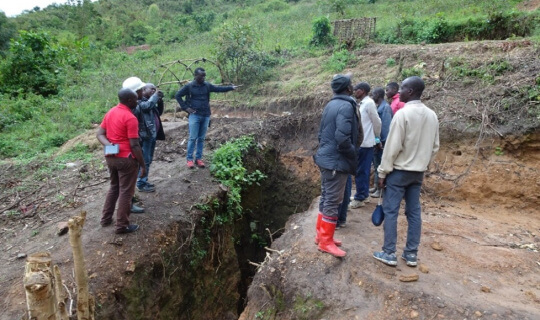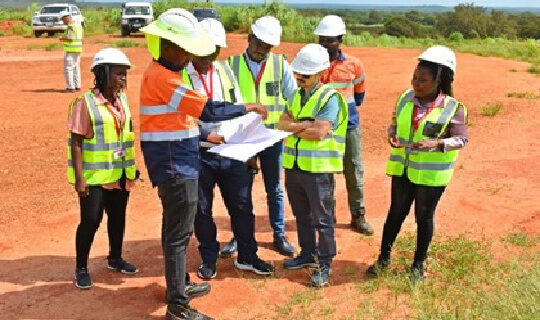Resource library
Our library identifies key resources to support implementation of the Voluntary Principles and international best practices related to security and human rights.


Implementing the Voluntary Principles can be challenging, especially when companies are operating in high-risk areas. Effective implementation usually requires the involvement of multiple stakeholders, including different actors within companies, community leadership, governments, NGOs, and service providers.
Our library identifies key resources to support implementation of the Voluntary Principles and international best practices related to security and human rights.
Implementation of the Voluntary Principles requires commitment and continuous effort to understand and assess human rights risks, and to ensure effective risk management measures are in place, including strong policies and procedures, security and human rights training, and stakeholder engagement. Assessing the results and seeking constant improvements is also key for the successful implementation in the long term. Members of the Initiative can also rely on the expertise and experiences of other members.
A number of tools and guidance materials have been developed to support the successful implementation of the Voluntary Principles on the ground, including 10 Steps to Maintain Security in Compliance with Human Rights and the Implementation Guidance Tool. These and many others are available on the Resources page, and can assist implementation in a variety of contexts and help address particular challenges.
Implementers of the Voluntary Principles make significant investments in developing and deploying training programs for public and private security service providers, company employees, and contractors to ensure security personnel respect and protect human rights. The VPI has a training course available on the Resources page.
Implementers regularly review their internal Voluntary Principles policies and procedures through self-assessment or third-party assurance to improve their practices. Tools are available to assist with assessment on the resources page. Members of the Initiative also participate in reporting, peer-learning and verification activities to demonstrate that they are committed to implementing the principles and to share lessons learned.
A training guide on the practical application of the principles to security operations for public and private providers. Freely available in English and Spanish.

The Voluntary Principles Initiative (VPI) promotes the implementation of the Voluntary Principles by providing members with resources to build their capacity to implement the Principles, by supporting In-Country Working Groups to address local implementation challenges; by promoting dialogue among members; and by monitoring and evaluating implementation.
Voluntary Principles implementation on the ground is always strengthened by constructive multi-stakeholder dialogue involving companies, NGOs and governments regarding security and human rights problems and challenges. The Initiative encourages those implementing the Voluntary Principles in complex contexts to foster multistakeholder dialogue, however informal, as a way to address problems collectively, and enhance human rights compliance.
The Voluntary Principles Initiative supports and collaborates with a network of VPI and partner multistakeholder In-Country Working Groups globally. In-Country Working Groups are intended to facilitate effective country-level implementation of the Voluntary Principles by improving stakeholder coordination and engagement, leading to constructive dialogue. The aim of the working groups is to build on-the-ground capacity to identify local in-country risks and challenges related to security and human rights, and to work to identify collective solutions to those challenges.
The VPI actively creates and financially supports a number of In-Country Working Groups, with a goal of their achieving financial sustainability over time. Working groups meet regularly but also plan and implement agreed-upon activities such as raising awareness and strengthening local capacity, surveying and reporting on local baselines, developing tools and approaches to support local needs. Ultimately, In-Country Working Groups seek to continuously improve their promotion of and respect for human rights in the context of their security practices and will make every effort to prevent conflict. The VPI In-Country Working Groups also seek to achieve the following outcomes:
Other Working Groups not created by the Voluntary Principles Initiative, called Partner In-Country Working Groups, conduct relevant work to promote best practices in a local context, on a national, sub-national or regional levels.

Since November 2022, the Brazil working group has been meeting quarterly, alternating online and in-person meetings. The group has very strong corporate participation from both the mining and oil & gas sectors in Brazil, as well as growing engagement with representatives from several ministries of the Brazilian Government, and civil society.

Two regional groups meet periodically in the Democratic Republic of the Congo, one focused on the provinces of Haut-Katanga, Lualaba and Kongo Central, and the other one on Sud-Kivu. The two groups work towards implementing best practices in human rights and safety in the mining, gas and oil sectors. They ensure the presence of a constructive dialogue that offers opportunities for cooperation between actors from civil society, companies and government.

Since 2017, the group meets quarterly to discuss security and human rights issues in the natural resource sector, to support government efforts to implement Voluntary Principles programs and policy, and to share best practices and lessons learned. Its priority areas include public security training, private security licensing and regulatory reforms, security and human rights application in small scale mining, and coordination between oil and gas sector actors and coastal communities.

Mozambique has two In-Country Working Groups, one operating at the national level, in Maputo, and the other one focused in the Cabo Delgado region. The working groups vision encompasses bolstering security measures, promoting sustainable development, and upholding human rights within the framework of multinational operations. Their activities include training and capacity building and knowledge sharing.

The In-Country Working Group in Myanmar met regularly from 2018 until suspending its activities due to the coup d’état in 2021. The Myanmar Centre For Responsible Business (MCRB) acted as the Secretariat and supported its activities. In addition to meeting periodically, promoting dialogue, and awareness-raising with stakeholders, the MDRB developed a baseline study of the security and human rights challenges in Myanmar.

Created in 2017, the group promotes the implementation of Voluntary Principles through advocacy and engagements, awareness campaigns, and training of critical stakeholders. A national baseline study on implementation in Nigeria was also conducted. Its activities include quarterly meetings, facilitation of advocacy engagements, multi-stakeholder dialogues, and capacity building training on the Voluntary Principles.

Peru has a national working group in Lima which has been meeting for over 12 years, with a longstanding track record of cross-pillar participation. More recently, a regional group was set up in Cusco. The working groups offer a multi-stakeholder space for dialogue and discussion on the Voluntary Principles and the UN Guiding Principles on Business and Human Rights.

Governments play a critical role in supporting Voluntary Principles implementation through various aspects of their activities – including their foreign policies and economic engagement with other governments. For example, governments often work through their embassies to engage with key players on the ground, including other governments, companies, and local members of civil society. Such engagement may include coordinating and supporting initiatives by companies, NGOs, and other governments; providing training; hosting learning forums; and promoting best practices with regard to Voluntary Principles implementation. Governments also support the Voluntary Principles through their economic and trade policies.

The application of the Voluntary Principles by companies supports improved practices at the project level. The Voluntary Principles provide a framework for companies to conduct an assessment of human rights risks associated with security, including an assessment of whether company actions might heighten or mitigate risk; engage appropriately with public and private security providers; institute human rights screenings for private security forces and encourage the screening of public security forces; take steps to promote the observance of best practices relevant to human rights and security; and develop company systems for reporting and investigating allegations of human rights abuses.

NGOs support the implementation of the Voluntary Principles by seeking to have them included in government and inter-governmental standards, as well as voluntary codes and initiatives. NGOs also support multi-stakeholder processes involving companies, local police and military, and communities. NGOs can support the implementation by convening multi-stakeholder meetings, support the activities on in-country working groups, and conducting training. Finally, NGOs help companies improve their practices and accurately identify risks.